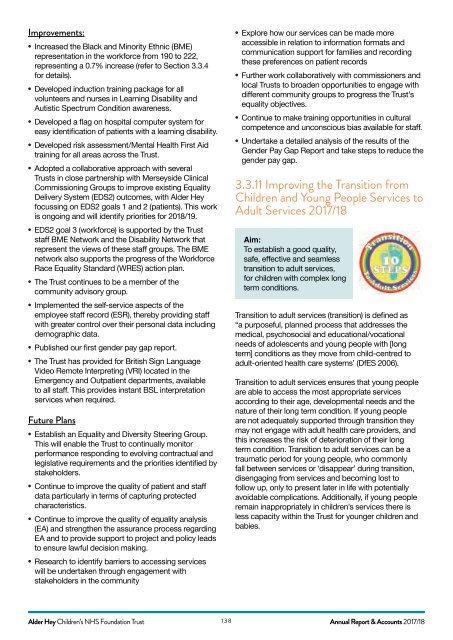AH ANNUAL REPORT 2018
Create successful ePaper yourself
Turn your PDF publications into a flip-book with our unique Google optimized e-Paper software.
Improvements:<br />
• Increased the Black and Minority Ethnic (BME)<br />
representation in the workforce from 190 to 222,<br />
representing a 0.7% increase (refer to Section 3.3.4<br />
for details).<br />
• Developed induction training package for all<br />
volunteers and nurses in Learning Disability and<br />
Autistic Spectrum Condition awareness.<br />
• Developed a flag on hospital computer system for<br />
easy identification of patients with a learning disability.<br />
• Developed risk assessment/Mental Health First Aid<br />
training for all areas across the Trust.<br />
• Adopted a collaborative approach with several<br />
Trusts in close partnership with Merseyside Clinical<br />
Commissioning Groups to improve existing Equality<br />
Delivery System (EDS2) outcomes, with Alder Hey<br />
focussing on EDS2 goals 1 and 2 (patients). This work<br />
is ongoing and will identify priorities for <strong>2018</strong>/19.<br />
• EDS2 goal 3 (workforce) is supported by the Trust<br />
staff BME Network and the Disability Network that<br />
represent the views of these staff groups. The BME<br />
network also supports the progress of the Workforce<br />
Race Equality Standard (WRES) action plan.<br />
• The Trust continues to be a member of the<br />
community advisory group.<br />
• Implemented the self-service aspects of the<br />
employee staff record (ESR), thereby providing staff<br />
with greater control over their personal data including<br />
demographic data.<br />
• Published our first gender pay gap report.<br />
• The Trust has provided for British Sign Language<br />
Video Remote Interpreting (VRI) located in the<br />
Emergency and Outpatient departments, available<br />
to all staff. This provides instant BSL interpretation<br />
services when required.<br />
Future Plans<br />
• Establish an Equality and Diversity Steering Group.<br />
This will enable the Trust to continually monitor<br />
performance responding to evolving contractual and<br />
legislative requirements and the priorities identified by<br />
stakeholders.<br />
• Continue to improve the quality of patient and staff<br />
data particularly in terms of capturing protected<br />
characteristics.<br />
• Continue to improve the quality of equality analysis<br />
(EA) and strengthen the assurance process regarding<br />
EA and to provide support to project and policy leads<br />
to ensure lawful decision making.<br />
• Research to identify barriers to accessing services<br />
will be undertaken through engagement with<br />
stakeholders in the community<br />
• Explore how our services can be made more<br />
accessible in relation to information formats and<br />
communication support for families and recording<br />
these preferences on patient records<br />
• Further work collaboratively with commissioners and<br />
local Trusts to broaden opportunities to engage with<br />
different community groups to progress the Trust’s<br />
equality objectives.<br />
• Continue to make training opportunities in cultural<br />
competence and unconscious bias available for staff.<br />
• Undertake a detailed analysis of the results of the<br />
Gender Pay Gap Report and take steps to reduce the<br />
gender pay gap.<br />
3.3.11 Improving the Transition from<br />
Children and Young People Services to<br />
Adult Services 2017/18<br />
Aim:<br />
To establish a good quality,<br />
safe, effective and seamless<br />
transition to adult services,<br />
for children with complex long<br />
term conditions.<br />
Transition to adult services (transition) is defined as<br />
“a purposeful, planned process that addresses the<br />
medical, psychosocial and educational/vocational<br />
needs of adolescents and young people with [long<br />
term] conditions as they move from child-centred to<br />
adult-oriented health care systems’ (DfES 2006).<br />
Transition to adult services ensures that young people<br />
are able to access the most appropriate services<br />
according to their age, developmental needs and the<br />
nature of their long term condition. If young people<br />
are not adequately supported through transition they<br />
may not engage with adult health care providers, and<br />
this increases the risk of deterioration of their long<br />
term condition. Transition to adult services can be a<br />
traumatic period for young people, who commonly<br />
fall between services or ‘disappear’ during transition,<br />
disengaging from services and becoming lost to<br />
follow up, only to present later in life with potentially<br />
avoidable complications. Additionally, if young people<br />
remain inappropriately in children’s services there is<br />
less capacity within the Trust for younger children and<br />
babies.<br />
Alder Hey Children’s NHS Foundation Trust 138<br />
Annual Report & Accounts 2017/18


